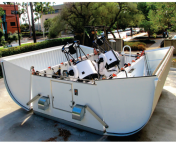Well it’s that time of year! Those of you who are going to be seniors might be looking forward to the monumental task ahead of filling out applications for graduate school. This is the first part of a 2-part astrobite on applying to graduate school. This will cover the things to consider and work on before you even download an application. Part two will focus on the application itself.
WHERE DO I START!?
A good place to begin is simply asking if graduate school is right for you. Are you excited to work on innovative projects? Do you have a desire to understand parts of our universe more deeply than anyone else? Does the potential to discover something completely new thrill you? If you answer yes to these questions than you are definitely in the right mindset to be a graduate student! Thoughts like “I don’t know if I have what it takes” or “I can’t afford grad school so I should probably do something else” are common but are not true of astronomy! You absolutely have what it takes to succeed in graduate school if you are excited to be there. No doubt it’s a very rigorous environment, but work ethic, not raw brain power, is a skill most graduates have. Also, the cost of graduate school doesn’t apply to astronomy grads. All major programs in the US will not only cover your tuition, but PAY YOU some stipend while you work! This is also true of other sciences.
FINDING THE RIGHT MATCHES
When you begin looking at schools to apply to, the task can seem rather impossible. There are just so many programs, it is hard to choose just a couple. The first step in picking a list is to define your own personal goals. What parts of astronomy are most exciting to you? Do you want to use the world’s largest telescopes or create simulations and run them on supercomputers? What type of career are you interested in? In astronomy, you can do observations, theoretical work, instrumentation, or any combination of these. Bear in mind that the best graduate program out there is the one that fits you best. This can be an Ivy League program or a small school with one other grad. Figuring out what you want is easily the hardest and most important part of applying to grad school. If you spend the time to do this, suddenly the number of schools right for you will be crystal clear. Remember that it’s ok not to have EVERYTHING figured out. If you have no idea if you are more interested in galaxies or stars, designing instruments or simulating the universe, there are many programs with a huge diversity of ongoing research to choose from. Part of graduate school is finding your passion along the way.
So how do you know if a school matches your interests? The best way is to identify faculty who perform this type of research at each school. There are several ways to go about doing this. One is to go to department websites and look at the faculty pages. Make sure to look carefully though! Here is a great blog post about that process. A more direct way is to talk with the astronomy/physics faculty at your undergrad institution. A lot of times they can point you in the direction of the schools who are known for their excellence in your areas of interest making your search much easier. Also don’t be afraid to contact potential advisors by email! In astronomy, its who you know. Making your name more familiar helps you tremendously when the department starts pouring over hundreds of applications.
Even after taking these steps, you may still find yourself interested in a dozen or more schools. Your decision to trim this list may be dependent on several things:
1. Your Budget: Applying to graduate school is EXPENSIVE. This is important to consider going in. Applications can cost anywhere from $50-100 (and maybe more now). You also need to send transcripts which your university will most likely charge you for (some schools want multiple transcripts!). There is also the cost of taking the regular and Physics GRE. In addition to paying for the test, ordering scores to be sent to the schools also costs money, although you can save some money by knowing which schools you want to apply to before you take the test. On both GRE’s they will ask you to list 4 schools you wish to send your scores to for free! Make sure you list the SAME 4 SCHOOLS on the regular and Physics GRE. In all, applying to 10 schools can cost you over $1,000…. so this can affect how many schools you apply to.
2. Confidence: Don’t let your confidence fool you in the process. Just because you think you CAN get into a program doesn’t mean you WILL. This opposite is true as well. You may not think you can get into that Ivy League program, but maybe you are exactly the person they are looking for. Be very careful of having too much confidence and only applying to a couple schools. Situations change with funding, previous class sizes, moving faculty, and even things like office space. Feeling really nervous about not getting in anywhere is completely normal, so to calm your nerves and improve your chances apply to a RANGE of schools. Aim high and don’t underestimate your chances at getting into those top programs! At the same time, apply to some places you think you are likely to get into but would still love to attend. If you get into everywhere you apply, you may fall in love with your backup on the visits and hate those places you thought were the best. See this astrobite about what visiting grad schools is like.
3. Family/Relationship Situation: Ah, the 2-body problem. First, do not feel embarrassed to ask for advice on this issue. Many couples go through it and work it out just fine. The question you need to ask yourself is how close you are to the person (married vs. dating) and how much your happiness depends on the happiness of the other person. Obviously if you are married/engaged, the question is a little easier because you must include the other half in the decision. The problem is tough when you are working it out with a girlfriend/boyfriend. How much are you willing to sacrifice for the other person? Would you be willing to give up your dream program for them? Do they have a career of their own they want to pursue? It’s complicated because likely you both care about each other’s happiness, but picking a grad program requires you to focus on yourself. Having successfully solved this problem myself, I will give one piece of advice: Be honest with each other about your wishes for the future. If staying together is what you both want, talk about the kinds of compromises you are both willing to make. Where do you want to end up? Are there overlaps with their choices? It is completely possible to work out a list of schools you are excited about while keeping the other person in mind, but it takes work and mature decision making. Whatever you choose, make sure you are happy!
YOUR FINAL LIST
The right number of schools is up to you. Some apply to as few as 5, others apply to more than 10. You should feel excited about every school on the list, even your “backups”. Never apply to a school just because. Have a reason for each place and at least 1 (preferably 2) faculty at each place you would love to work with. Once you have your final list, its time to move forward with the applications.
Check out Part Two to this astrobite where I sum up the application process and the essential checklist that needs to be completed!






What a great post! I’ll definitely be forwarding it to undergraduates I know who are applying to graduate school. There’s one point that I’m wondering if you’d consider addressing in greater detail in future posts. You touched briefly on the expense of applying for graduate school. $1000 is a formidable investment for almost any student but for some, who need every penny of loans, summer, and work-study earnings to pay tuition, it can be an insurmountable barrier. This may be part of the reason that astronomy graduate programs often fail to recruit talented people from a range of socioeconomic backgrounds. There may be help available for students struggling to obtain the funds to apply, including:
– Fee waivers for the GRE and graduate school applications. I’ve heard that these can be very hard to qualify for, but that Pell Grant recipients are often eligible.
– Grants and funds from the applicant’s department. Perhaps the applicant should talk to their department advisor about this possibility.
– University-wide funds at the applicant’s university. A financial aid officer may be able to point the applicant in the right direction.
– There may the possibly of taking out additional loans to cover graduate school applications.
Unfortunately I am too ignorant on this subject to write a post myself, but I wonder if any of the astrobites writers or your audience might have advice on this issue.
Anyway, thanks for writing this very helpful post and for highlighting important things to consider before applying!
Thanks for your comment! I completely agree with you, and would go so far to say that this is an issue which plagues higher education in general. Like you mentioned, there are ways to procure funds to help ease the burden, but they are tough to come by. Given that this topic is wide ranging and very complex, I will probably refrain from tackling alternatives in this post, but possibly in a future post. Thanks for reading!
Great post!
I’m wondering about the extra steps that someone with no Physics or Astronomy background would have to take to pursue graduate studies in Astro Ph ?
I ,for example, am extremely eager to pursue this path .Although I have an IT degree and feel like a deer caught in the headlights when I think about where to start or what to do!
I thought about taking some undergrad physics courses but this option is not possible since I currently work abroad!
I would really appreciate if anyone’s able to shed some light on the starting point of this journey.
Thanks
I know several students who have come to astronomy PhDs from roundabout ways, so it’s definitely possible! Of course, it isn’t the route I took so all I can offer up are some random ideas. Since taking some physics courses isn’t an option, you might consider studying on your own. I imagine doing well on the physics GRE would go a long way towards proving you are capable of graduate coursework (of course, many astronomy/astrophysics programs don’t require the physics GRE). Research is also a huge part of graduate work so volunteering in a lab would be beneficial – but again, I’m not sure how this would play out abroad. Best of luck!
Thank you very must for your helpful post.Sorry it took so long to reply back.
I have started preparing for the Physics GRE on my own . Hopefully it will suffice. Thanks again ,Elisabeth.